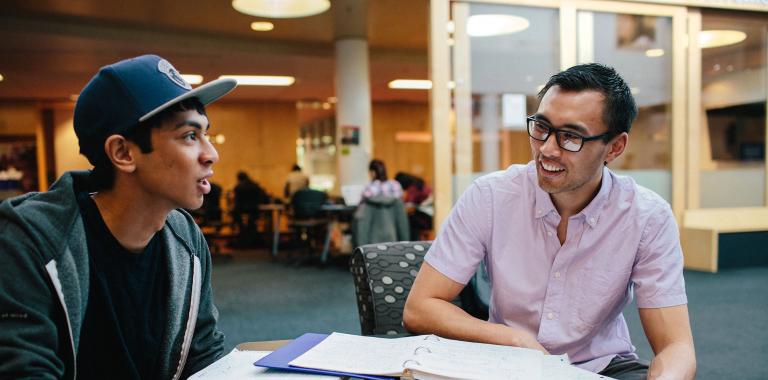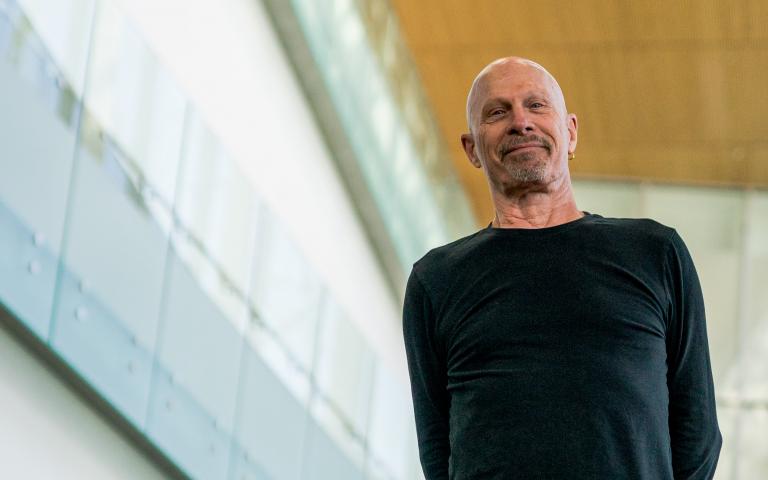
They assign us homework, mark our papers, and give us grades. But there’s a whole lot more to the role (and lives) of our profs at UBC.
UBC profs come from a wide variety of backgrounds and perform plenty of other tasks beyond those visible to us. Teaching is a large component of their work, but so is research, supporting students, and helping with university administration.
Perhaps you know your professors well. Or perhaps you’ve been a bit too shy to interact with your instructors outside of a lecture. I certainly was when I was completing my undergraduate degree.
If you think about it though, university profs are kind of like the ‘eternal student’. They can relate to many of the same stresses that we students face: endless readings, huge workloads, multiple deadlines, the pressure to succeed, perhaps even the temptation to procrastinate.
UBC fyi recently connected with four professors, including psychology professor Lawrence Ward, across UBC to get a glimpse into their lives—how they manage “work” vs. “life”, what habits have been crucial to their success, and what would be their second-choice profession (next to being a prof here, of course). Here’s what they learned.
Lawrence Ward
Professor, Department of Psychology
Lawrence Ward is a professor of cognitive neuroscience at UBC, but he’s also a dancer, musician, orchardist, and lover of the performing arts, science fiction novels, and learning in general. In his work—which he doesn’t consider work, because he enjoys doing it—he performs a wide variety of activities ranging from teaching classes, conducting lab research, and analyzing data, to supervising students’ theses and writing grant proposals.
As someone who studies how the brain works when we do what we do, he shares a simple but effective technique for tackling any large task: organizing it into approachable chunks. An author of 9 books and numerous peer-reviewed papers, he’s definitely no stranger to large tasks.


As someone who has a lot of deadlines to juggle, how do you maintain a work-life balance?
My work is usually very enjoyable so although I do work a lot I don’t feel that my work is “work” in the pejorative sense. Indeed I don’t really understand what “work-life balance” means. The implication is that I am not living when I work. That is false. I know I am lucky—for some people work is an onerous chore they have to do in order to “live” outside of that onerous chore. But usually I want to spend my time doing what I am doing.
Having said that, I do other things than my UBC-related work. I am a dancer and I still attend around 2 classes per week. Previously I was a gymnast and practiced about 4 times per week. I play the guitar and sing, and my wife and I have a hobby orchard in Osoyoos. My wife and I take walks, go to the symphony and ballet regularly, see an occasional play, opera, or movie, and spend family time with our grown children. So I do a lot besides UBC-related work (which I mostly don’t define as “work”).
What is one key habit you’ve developed that has helped you succeed in your work?
I think the most useful habit is organizing things into doable chunks. This is the only way I’ve found I can accomplish large tasks. I had a prof in grad school who wrote a book one page per day. I was impressed by this and although I might do more or less than that in a given day, I usually chunk any task. Some tasks take only one chunk and some take more. I’m on my second chunk on this task.
If you weren’t a professor, what would you be and why?
I can’t easily imagine myself as anything else. Maybe a professor in a different field—like physics. Or maybe a doctor—likely a neurologist (not a neurosurgeon—I’m too clumsy). I have always been interested in biology, the brain, etc.
I could be a science fiction writer perhaps, because I love the genre and have plans to write a novel or two when I have time. I maybe could have been a professional dancer. I guess I’m semi-pro, having performed a fair amount, even toured with a professional company, but probably only a low-level one in a difficult life, so probably not that. Nope, academic life suits me to a T. I’ll put up with the crappy, boring bits to get the good stuff, the freedom and fascination with creating new knowledge built upon the old.
Meghan Allen
Instructor, Department of Computer Science + Vantage One
Meghan Allen has been on campus longer than some of you have been alive. She started as an undergraduate student and is now in her 20th year at UBC. She teaches a range of Computer Science courses, particularly to first-year international students in the Vantage One program.
Between giving lectures, holding office hours, marking assignments, peer-reviewing papers, and even providing past students with career advice, Meghan also spends time thinking about how to design effective courses and is getting ready to present at a computer science education conference. Learn the two productivity apps she relies on to manage all the commitments on her plate.


As someone who has a lot of deadlines to juggle, how do you maintain a work-life balance?
Some of my job has to be done on campus—teaching, office hours, meetings—but other tasks can be done anywhere. This flexibility helps me maintain my work-life balance while introducing some challenges at the same time. For example, the flexibility allows me to take occasional mornings or afternoons to spend with my twins’ grade one class or to work at home and avoid my long commute. But it also makes it more difficult to draw the line for when I’ve done enough work for the day and should close my computer.
What is one key habit you’ve developed that has helped you succeed in your work?
I use my Google Calendar and to-do list on Trello religiously. If something needs to be done, I need to write it down so that I don’t forget about it. Some of my tasks, like prepping for an upcoming class, are easy to remember but some of the longer-term tasks would be more difficult to remember if they weren’t on my list. My Google Calendar allows me to see my work commitments in the same place as my family and personal commitments, which helps me plan my weeks.
If you weren’t a professor, what would you be and why?
I enjoy travelling and my partner is a great writer so maybe we could travel the world together and make money from a travel blog. I also love animals and would love to breed dogs or have a doggy daycare. Maybe that can be a retirement dream!
Gavin Paul
Sessional Lecturer, Arts One
Want to know how to transfer from accounting to Shakespearean literature? Gavin Paul is the guy to talk to. Gavin is a Lecturer in Arts One, where he specializes in English lit, but he started out as a business major.
When he’s not teaching classes, leading seminars, or conducting writing workshops, he can be found marking essays, often at his kids’ sports and dance practices. Gavin has an undying love for comic books and shares fiction and creative non-fiction on his blog. His advice: stay humble. You don’t know everything and—he’ll be the first to tell you—neither does he.


As someone who has a lot of deadlines to juggle, how do you maintain a work-life balance?
A supportive family is key. A life in academia really doesn’t have any fixed boundaries—there are always more books to read, essays to mark, conferences to attend, conversations to have, always more writing to be done. The job involves processing information and the information is limitless. This means you have to set your own boundaries and stick to them. This isn’t easy. I try to stop checking email after a certain time each day, and weekends are for the family.
What is one key habit you’ve developed that has helped you succeed in your work?
Stay humble. Universities are often overwhelming, intimidating spaces—for professors as much as for students. For much of my life as a student and instructor, I felt tremendous pressure to know all of the answers and was often crushed when I was asked something I couldn’t adequately respond to. I still feel that pressure, but somewhere along the line, telling my students “I don’t know” became empowering and liberating. We are all here not because we know everything, but because we want to recognize what we don’t know. It sounds like a simple distinction, but identifying it was huge for me.
If you weren’t a professor, what would you be and why?
I started off in business, believe it or not, and I have an undergraduate degree in Business Management with a major in accounting. So I would probably be the world’s hippest accountant. The world’s hippest accountant who secretly reads literature at his desk when no one is looking.
Nisha Malhotra
Senior Instructor, Vancouver School of Economics
If you ask Nisha Malhotra what amazes her most about UBC, she’ll tell you it’s observing the kindness and respect that her students display, both in and out of the classroom. An instructor who believes that teaching is something she was “fated” to do, she enjoys incorporating social media into her classes. Nisha has also found a way to combine her work with her hobbies: after getting interested in video editing, she started a YouTube channel focusing on economics.
When she’s not teaching, she’s advising students, facilitating or attending workshops on teaching and learning, keeping up with the latest research in economics, or answering emails. With up to 300 students a semester, that’s a lot of emails.


As someone who has a lot of deadlines to juggle, how do you maintain a work-life balance?
For me there is no definite line between work and life; the two merge and overlap and I rarely try to balance hours between the two. Several of my creative hobbies have become part of my teaching tools and some work tasks become projects with my son.
A few years ago I got into video making and editing. This hobby that I developed during my supposedly “life” phase helped me develop video tutorials for my students and create a YouTube education channel for my “work” phase. Also, my son likes to join me at some of my students’ events. For example, at a fundraiser event held by UBC’s sew and knit club, my son volunteered to model—it was an opportunity for students to see the human side of me and for my son to interact with role-worthy undergrads.
What is one key habit you’ve developed that has helped you succeed in your work?
I would say carving out time blocks or slots for important work. It’s not really a habit but a work strategy that I have used since I was a child. When I face a deadline or need to finish a project, I block out certain hours in a day for that particular task. These hours are strictly and solely devoted to that one thing and one thing only. I find a place with little or no distractions, like Internet or access to exciting projects or people, and block hours when I would not be disturbed. These intensely focused and productive slots help me achieve in a few hours what would otherwise take weeks in a distracted and lazy environment.
If you weren’t a professor, what would you be and why?
I was fated to be an educator. As a student I had excellent teachers who took pride in their job. I really valued my interactions with them, which shaped my career path. So, I would have found a similar career requiring human interactions with opportunities to encourage, educate, and assist others. But, if I couldn’t be in a field related to education, then maybe a profession that includes my other activities. When I procrastinate, I either end up learning software, playing video games, or designing websites, digital logos, or posters—so I think a computer geek and a digital designer.
This article was written by Ryan Patrick Jones, a graduate student in Journalism.
It was originally published on the UBCfyi Blog. Read the original article.


